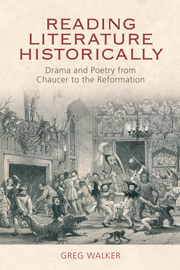Book contents
- Frontmatter
- Contents
- Acknowledgements
- Dedication
- Introduction: Literature and History: The Risks of Conversation
- Part I Drama
- Part II Poetry, 1380–1532
- 4 Courtesy and Chivalry in Sir Gawain and the Green Knight
- 5 The Plowman's Tale and the Politics of 1532: A Cautionary Tale?
- 6 Rough Girls and Squeamish Boys: The Trouble with Absolon in The Miller's Tale
- Index
5 - The Plowman's Tale and the Politics of 1532: A Cautionary Tale?
from Part II - Poetry, 1380–1532
Published online by Cambridge University Press: 05 October 2013
- Frontmatter
- Contents
- Acknowledgements
- Dedication
- Introduction: Literature and History: The Risks of Conversation
- Part I Drama
- Part II Poetry, 1380–1532
- 4 Courtesy and Chivalry in Sir Gawain and the Green Knight
- 5 The Plowman's Tale and the Politics of 1532: A Cautionary Tale?
- 6 Rough Girls and Squeamish Boys: The Trouble with Absolon in The Miller's Tale
- Index
Summary
On 18 March 1532 a radically anti-clerical document, the House of Commons' ‘Supplication Against the Ordinaries’ was formally presented to Henry VIII. It outlined a series of complaints about the behaviour and jurisdiction of the English bishops, particularly concerning the administration of the ecclesiastical courts, and called upon the king to remedy what it identified as serious abuses against the ‘poor commons’ of England. The presentation of the Supplication was the culmination of the intense debate between supporters and critics of the privileges of the clergy that was raging both within the Reformation Parliament and in the country beyond, which was touched upon in Chapter two in the context of The Interlude of Godly Queen Hester: a debate that became so intense that contemporaries spoke of it as a new and unprecedented break, a furious schism, between the clergy and the laity in England.
While this debate was raging, a second text fiercely critical of the clergy was published from the press of the London printer Thomas Godfray. From its opening lines it seemed to address directly the contemporary situation:
A sterne stryfe is stered [stirred] newe
In many stedes in a stound [places at once];
Of sondre sydes [seeds] that be sewe
It semeth that some be unsounde. (53–6)
- Type
- Chapter
- Information
- Reading Literature HistoricallyDrama and Poetry from Chaucer to the Reformation, pp. 121 - 168Publisher: Edinburgh University PressPrint publication year: 2013



